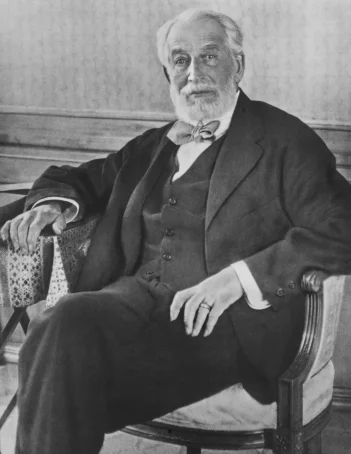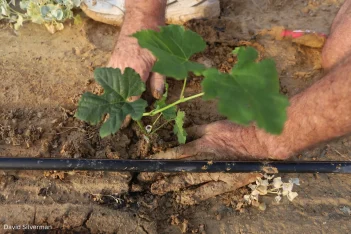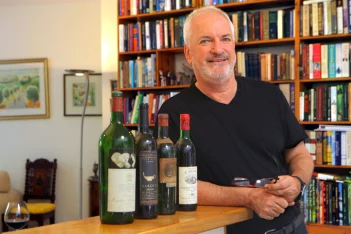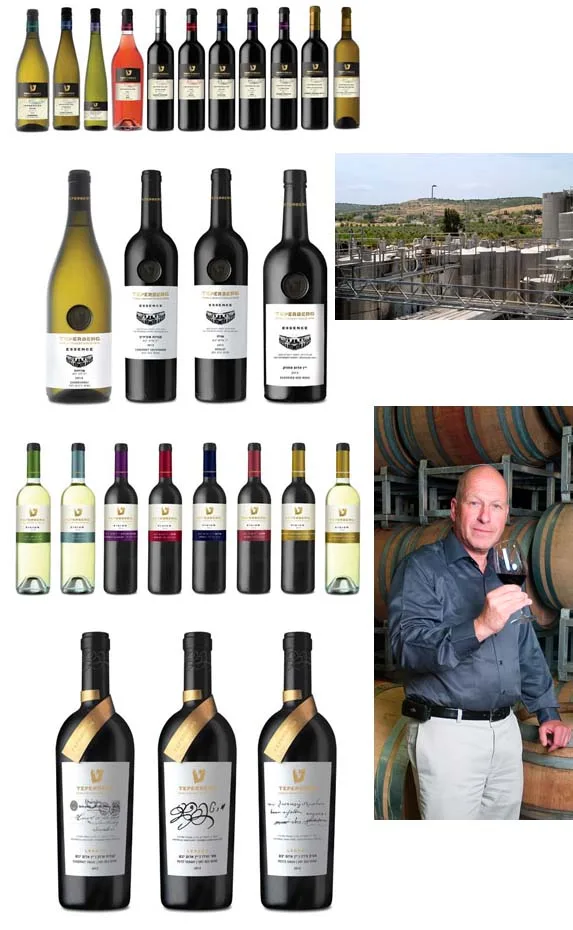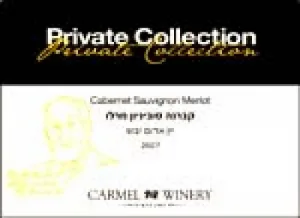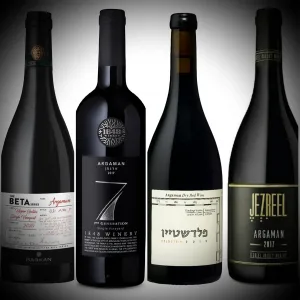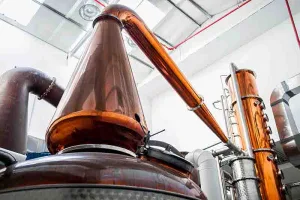The Teperberg Winery has recently launched a new look for their wines, across the board. This historic winery therefore completes a process which began a long, long time ago.
There are four revolutions that characterize the history of Israeli wine. First there was the French Revolution, when the wine industry was founded in the 1880’s by Rothschild, using French expertise. In the 1980’s the New World Revolution began, led by Californian winemakers, improving the quality of Israeli wines. The 1990’s was the beginning of the Boutique Winery Revolution, which provided color and variety.
Teperberg is part of the latest revolution, the Traditional Winery Revolution. Since the beginning of the 2000’s, there are has been a noteworthy renaissance of the large wineries.
The first of the traditional wineries to transform itself was Carmel Winery. Today their finest wines are amongst the best in Israel. Another was Binyamina Winery. The current talented winemaking team of Yiftach Peretz and Yael Sandler are making pretty good wines today.
Do you remember Askalon Wines They became known as Segal Wines and also started making some quality wines, particularly in the hands of winemaker Avi Feldstein. Even traditional wineries such as Arza and Zion started to make changes. And then there is Teperberg.
The family saga began in 1827, when Avraham Teperberg fled Odessa to avoid the army and ended up in Austria. There he would have come into contact with wine for the first time and picked up his Germanic sounding name. In 1850 he made Aliya to Israel and in 1852 he began trading in wine and spirits. Amongst his customers were Christian Arabs and Templars. His legacy was that he founded a wine dynasty that would last until today.
His son, Zeev Zaide Teperberg, decided it was not enough to distribute wine, but that they should make their own. He established a winery in 1870, which was situated between Yehudim Street and Habad Street in the Old City of Jerusalem, not far from the Zion Gate.
Sir Moses Montefiore was the most distinguished overseas visitor to Jerusalem at this time. He drank a bottle of wine every day and he would buy small casks of wine as a souvenir. Furthermore every community or individual he visited would welcome him with a bottle of their finest wine. It amuses me to think that on one of his visits to Jerusalem, he may have come across either a Teperberg or his wine. Maybe fanciful on my part, but it would certainly have been quite feasible.
The third generation was Mordechai Shimon Teperberg. By now the business included a winery, a distribution business and retail shops in Jaffa and Jerusalem. In 1921 there was a costly court case between the Teperberg and Carmel wineries over a disputed logo, the one of the two spies carrying the bunch of grapes, which they both claimed as their own. In 1925 the winery was forced to leave the Old City due to Arab riots, and the request by the British Mandate that industry should leave the area. They moved the winery to Romema in Western Jerusalem, later to be the site of the Egged bus station.
Also in 1925, the Teperberg and Segal families went into partnership to build a distillery at Sarona, within the Templar community. The Segals provided the distilling expertise, and the Teperbergs, the marketing, distribution and retail knowhow.
This business failed because raw materials became more expensive and at the same time, the British permitted the import of spirits and liqueurs. Mordechai Shimon wanted to leave the drinks business, but he was persuaded to continue by his Rabbi. In the end they lost a lot of money and the winery went bankrupt in 1929.
The revival of the business was led by the very young Menachem Teperberg, the fourth generation, along with his brother Yitzchak. He reestablished the family winery in 1951 in Mahane Yehuda and named it ‘Efrat’, after the ancient route the grapes travelled from Bethlehem to Jerusalem. Menachem decided to focus on the winery and passed the retail part of the business on to another brother. In 1964, they moved to Motza, the village at the entrance to Jerusalem.
Efrat was a small winery, no larger than a medium sized boutique winery today. Enter Moti Teperberg, the fifth generation. He joined the business in 1976 and became CEO in 1984. Slightly hunched like a prize fighter, almost bobbing and weaving as he waits for the next opportunity to catch his interest, he has a ready smile and hyper active air about him. He came in to a winery mainly selling Kiddush wine, grape juice and alcohol to the Jerusalem market. The first thing he did was grow the business, until the Motza winery was bursting at the seams. In ten years from the late eighties, the winery’s production grew tenfold.
He was always a business man before a wine guy, but he had the vision to realize that trends were changing. A winery could no longer live off Kiddush wine and grape juice. He understood that to improve the final product he would have to seek better vineyards or gain more control of vineyard management and employ an internationally trained winemaker. The winery would need to move to a new, larger site, and invest in more advanced equipment and technology. And, step by step, that is what he did.
Firstly he employed a new winemaker. Shiki Rauchberger became the chief winemaker in 2002. He has a reputation as one of the leading winemakers in the country. Previously he worked at Carmel’s Rishon Le Zion Cellars. He studied at UC Davis and worked with the legendary wine consultant Peter Stern. The associate winemaker, Olivier Fratty, who studied in Bordeaux, joined him in 2006. They are obviously a very successful partnership. The union between the two schools, new and old world, clearly works to the good of the end product.
In 2006, the winery moved to a new site in the Judean Foothills, near Dir Rafat, close to vineyards as Moti always wished. They changed the name of the winery from Efrat to Teperberg, to emphasize it was still a family winery.
Now, they have come up with a complete new branding. The new logo is a very traditional, large Tet (the Hebrew letter) and the slogan is ‘Family winery since 1870.’ The new labels cleverly emphasize family, history and tradition with a touch of modernity.
Today Moti Teperberg is the longest serving CEO of a winery. Teperberg has grown to be the fourth largest winery in Israel and the largest family winery. In 2014 the winery harvested over 7,000 tons of grapes, a far cry from the 250 tons harvested in 1989.
If Zeev Zaide visited today, everything would be unfamiliar. The grape varieties (international varieties instead of local Arab grown varieties), the vineyards (all over, instead of just from Bethlehem & Hebron), the style of wines (dry instead of sweet), the size of the operation, the number of stainless steel tanks…. However he would recognize the name over the door (and on the label), and this would make him feel very much at home. I am certain he would be very proud of his great grandson. Y’Shar Koach Moti & Shiki!
Teperberg Vision Dry White 2014
Light fragrant easy drinking white. Fruity, dry, but with a touch of sweetness and refreshing finish. Great aperitif. NIS 35
Teperberg Vision Malbec 2014
Teperberg is the pioneer of Malbec. This is the entry level. Fruity with an aroma of forest fruits, a touch of greeness, nicely weighted with a clean finish. NIS 35
Teperberg Impression Sangiovese 2014
Light colored, red cherry, berry nose, white pepper, balanced by vanilla flavors. It has a refreshing finish. NIS 45
Teperberg Legacy Petite Sirah 2012
Legacy is the prestige label in a bombastic bottle that makes a heavy port bottle seem light! The wine is a deep colored, powerful but velvety wine, with a ripe plum aroma, a hint of violets and full mouth feel. NIS 170
Teperberg Legacy Petit Verdot 2012
A powerful, full bodied wine, though closed and needing time. It is all there and will soften and open with bottle age. Well worth coming back to it in six months. NIS 170












